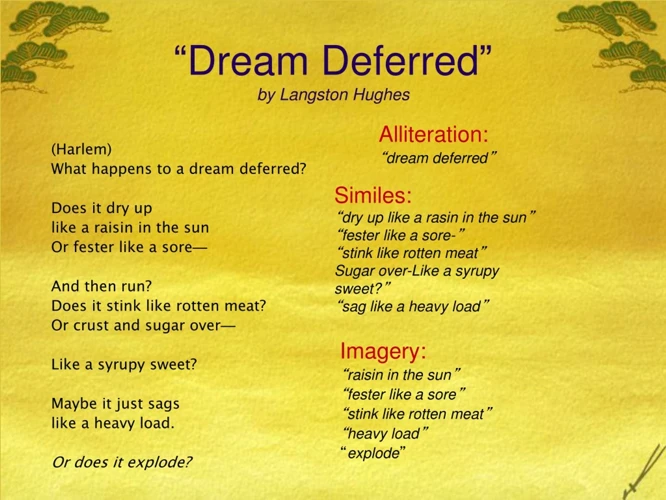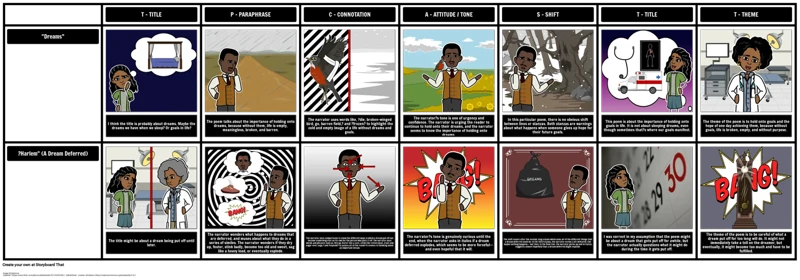Intriguing Meanings Behind a Dream Deferred: Unveiling Symbolism and Interpretations
Have you ever wondered about the profound significance of a dream deferred? Langston Hughes, a famed poet of the Harlem Renaissance, delved into the intricacies of this concept through his timeless poem “Harlem.” In this article, we will embark on a journey to unravel the layers of symbolism and interpretation within a dream deferred. From its representations of frustration and delayed ambitions to its sociopolitical commentary, we will explore the various facets of this captivating concept. Additionally, we will examine the vivid symbolism employed by Hughes, including the imagery of a raisin in the sun, a festering sore, and an exploding pressure cooker. Get ready to delve into the mindscape of dreams deferred as we explore the profound influence of Langston Hughes and the cultural significance of this poetic masterpiece.
The Concept of a Dream Deferred

The concept of a dream deferred revolves around the idea of unfulfilled aspirations and the consequences of delaying or suppressing one’s dreams. It challenges us to ponder the emotional and societal implications when these dreams are put on hold. This notion is brilliantly explored in Langston Hughes’ poem “Harlem,” where he poses the question, “What happens to a dream deferred?” The poem itself serves as an introspective exploration of the human experience and the fragility of dreams. Whether it is the frustration of delayed ambitions, the suppression of emotions and desires, or the sociopolitical commentary it encompasses, the concept of a dream deferred serves as a thought-provoking subject.
Interpretations of a Dream Deferred

Interpretations of a dream deferred are multifaceted, reflecting the complex emotions and experiences of individuals. Three key interpretations emerge from Langston Hughes’ poem “Harlem.” Firstly, a dream deferred can signify frustration and delayed ambitions, causing a sense of discontent and dissatisfaction. Secondly, it represents suppressed emotions and desires, highlighting the toll of unfulfilled yearnings on one’s wellbeing. Lastly, the concept serves as a powerful sociopolitical commentary, shedding light on the consequences of systemic oppression and the impact on marginalized communities. Each interpretation interweaves into the broader narrative of “Harlem,” urging introspection and inspiring dialogue on the significance of unfulfilled dreams. By exploring these interpretations, individuals can gain a deeper understanding of the manifold implications of dreams deferred in their own lives and the world around them. You can find more insights on the meaning of a dream deferred here.
1. Frustration and Delayed Ambitions
Frustration and delayed ambitions play a significant role in understanding the meaning of a dream deferred. The concept captures the feelings of disappointment and discontent that arise when one’s aspirations are put on hold or denied realization. It highlights the emotional toll of having one’s hopes and dreams constantly postponed, resulting in a simmering frustration. This can lead to a sense of restlessness, unease, and even resentment. In Hughes’ poem, the speaker contemplates the consequences of unmet goals, emphasizing the psychological and emotional impact of deferred dreams. The line, “Does it dry up like a raisin in the sun?” poignantly illustrates the withering and shrinking of ambitions when left unfulfilled. It serves as a stark reminder of the toll that deferred dreams can take on an individual’s well-being and sense of purpose.
2. Suppressed Emotions and Desires
Suppressed emotions and desires play a significant role in the interpretation of a dream deferred. When dreams are left unfulfilled or delayed, individuals often find themselves repressing their innermost emotions and desires. This suppression can lead to a range of consequences, including feelings of frustration, discontentment, and even resentment. The poem “Harlem” by Langston Hughes poignantly captures the impact of stifled aspirations on the human psyche. It serves as a reminder of the importance of acknowledging and addressing our true emotions and desires, as neglecting them can result in a disillusioned existence. The concept of suppressed emotions and desires within a dream deferred encourages us to reflect on the potential repercussions of denying ourselves the pursuit of our deepest aspirations.
3. Sociopolitical Commentary
Sociopolitical commentary is a prominent theme in the concept of a dream deferred. Through his poem “Harlem,” Langston Hughes raises questions about the impact of societal and political forces on the pursuit of dreams. The poem was written during the height of the Harlem Renaissance, a period marked by racial and social inequalities in America. Hughes masterfully highlights the consequences of oppression and the denial of equal opportunities, specifically for African Americans. The deferred dream represents not just an individual’s unfulfilled aspirations, but also the collective dreams of an entire marginalized community. It serves as a critique of discrimination, systemic racism, and the barriers that obstruct progress and success. Hughes’ sociopolitical commentary forces readers to confront the harsh realities faced by many in their pursuit of happiness and fulfillment.
Symbolism in a Dream Deferred

Symbolism plays a significant role in portraying the complexities of a dream deferred. Langston Hughes expertly utilizes vivid imagery to convey the profound impact of unfulfilled dreams. One of the notable symbols in Hughes’ poem “Harlem” is the metaphor of a raisin in the sun. This seemingly small and insignificant object represents the withering and drying up of dreams when neglected or postponed. Another striking symbol is the festering sore, an image that evokes the idea of suppressed emotions and desires. It reflects the underlying turmoil and discomfort that arises from unaddressed ambitions. Lastly, Hughes employs the symbol of an exploding pressure cooker, representing the potentially explosive consequences of stifled dreams and the released energy and tension once dreams are finally pursued. Through these powerful symbols, Hughes prompts us to reflect on the lasting impact of unattained dreams and the urgency to cultivate and nurture them before they turn into lingering regrets.
1. The Raisin in the Sun
The image of a raisin in the sun is a powerful symbol captured within the poem “Harlem” by Langston Hughes. It represents the withering and shriveling of dreams when they are postponed or suppressed. Just as a raisin loses its vitality and succumbs to time, a dream deferred loses its vibrancy and potential. This metaphor highlights the notion that delaying one’s dreams can result in a sense of insignificance and fading away. The raisin in the sun serves as a poignant reminder of the consequences that arise from neglecting or deferring our aspirations.
2. A Festering Sore
In the context of a dream deferred, Langston Hughes employs the powerful imagery of a festering sore. This vivid metaphor suggests that a dream deferred can become a source of pain and discomfort when left unresolved. Just like a sore left untreated, an unfulfilled dream can fester and create a deep sense of dissatisfaction and restlessness within an individual or a community. The image of a festering sore highlights the urgency and importance of addressing and pursuing one’s dreams before they become a source of ongoing agony. It serves as a reminder of the consequences that can arise from ignoring or delaying the pursuit of our deepest desires.
3. Exploding Pressure Cooker
3. Exploding Pressure Cooker:
In Langston Hughes’ poem “Harlem,” one powerful symbol that represents a dream deferred is the metaphor of an exploding pressure cooker. This vivid imagery captures the immense pressure that builds up when dreams are postponed or denied. Just like a pressure cooker, where heat and steam build up until it reaches a breaking point, the unfulfilled dreams of individuals and communities can lead to explosive outcomes. The metaphor highlights the potential danger and volatility that arises when people are continuously denied the opportunity to pursue their dreams. It serves as a reminder of the consequences that can arise from suppressing and ignoring the aspirations of marginalized groups. The pressure cooker symbolizes the pent-up frustrations and tensions that can manifest explosively if dreams are not given the chance to flourish. This image provokes contemplation about the repercussions of a dream deferred and emphasizes the urgency to address and fulfill the dreams of all individuals and communities.
Exploring the Influence of Langston Hughes
Exploring the influence of Langston Hughes unveils the lasting impact he has had on literature and the cultural landscape. As a pioneer of the Harlem Renaissance, Hughes’s poetic works, including “Harlem” and his collection “Montage of a Dream Deferred,” have become emblematic of African American voices and experiences during the early 20th century. With his powerful use of imagery, rhythmic language, and social commentary, Hughes captured the essence of the human condition and exposed the realities of racial inequality and systemic injustice. His profound influence on future generations of poets and writers cannot be overstated, as his words continue to resonate and inspire today. Through his ability to articulate the complexities of the dream deferred, Hughes solidified his status as a literary icon whose impact reaches far beyond the boundaries of his time.
Conclusion
In conclusion, the concept of a dream deferred, as explored by Langston Hughes in his poem “Harlem,” captures the complexities of unfulfilled aspirations and the consequences of delaying or suppressing one’s dreams. It serves as a powerful commentary on the human experience, inviting us to reflect on the emotional and societal implications when dreams are put on hold. The symbolism and interpretations within a dream deferred provide a rich tapestry of meaning, showcasing frustration, suppressed emotions and desires, and sociopolitical commentary. Through Hughes’ remarkable use of imagery, such as the raisin in the sun, a festering sore, and an exploding pressure cooker, the impact of deferred dreams is vividly conveyed. As we delve into Hughes’ work and contemplate the significance of dreams deferred, we gain a deeper understanding of the influence of this poet and the cultural relevance of his timeless masterpiece.
Frequently Asked Questions
1. What does the phrase “dream deferred” mean?
The phrase “dream deferred” refers to the postponement or delay of one’s aspirations or desires. It explores the consequences and emotional impact of not pursuing one’s dreams.
2. Who coined the term “dream deferred”?
The term “dream deferred” was popularized by the renowned poet Langston Hughes in his poem “Harlem,” published in 1951. Hughes is a prominent figure of the Harlem Renaissance and known for his exploration of African American experiences.
3. What are some common examples of dreams deferred?
Common examples of dreams deferred can vary from person to person, but they may include career ambitions, artistic pursuits, educational goals, or personal aspirations that have been put on hold or delayed for various reasons.
4. What emotions are associated with a dream deferred?
A dream deferred can evoke a range of emotions such as frustration, disappointment, anxiety, and a sense of longing. It can also lead to feelings of regret or resentment if the dream is consistently postponed or never realized.
5. Are dreams deferred always negative?
While dreams deferred are often associated with negative emotions, they can also serve as motivation or fuel for personal growth. Sometimes, deferred dreams can lead individuals to reevaluate their aspirations and take different paths towards achieving their goals.
6. How does a dream deferred impact individuals and society?
A dream deferred can have significant impacts on individuals and society at large. Individually, it may lead to frustration, unhappiness, or a sense of unfulfillment. Societally, the suppression of dreams can lead to talent and potential being left untapped, limiting progress and creativity.
7. What is the meaning behind Langston Hughes’ poem “Harlem”?
“Harlem” reflects on the African American experience and the effects of deferred dreams. It offers poignant social commentary on the challenges faced by individuals and communities when their dreams are continuously postponed or crushed.
8. How does Langston Hughes use symbolism in “Harlem”?
In “Harlem,” Hughes employs vivid symbolism to depict the consequences of deferred dreams. He utilizes imagery such as a raisin in the sun, a festering sore, and an exploding pressure cooker to evoke powerful visual metaphors that represent the decay and explosive potential resulting from stifled dreams.
9. What is the historical significance of Langston Hughes’ poem?
Langston Hughes’ poem “Harlem” holds historical significance as it captures the spirit of the Harlem Renaissance, a period of cultural revolution and artistic resurgence among African Americans in the 1920s and 1930s. It acts as a reflection of the social and racial climate of the time.
10. How does the concept of a dream deferred resonate in today’s society?
The concept of a dream deferred remains relevant in modern society, where individuals continue to face obstacles and setbacks that delay the pursuit of their dreams. It serves as a reminder to examine the consequences and emotions tied to unfulfilled aspirations, encouraging us to take action and prioritize our dreams.

